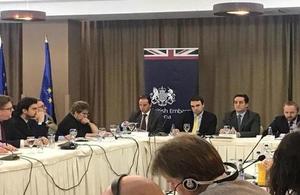British Embassy in Kosovo supports the publication of annual report on war crimes
British Ambassador Ruairí O’Connell’s speech at the launch of the report ‘War Crime Trials – What Comes Next?’, supported by the British Embassy.

British Embassy in Kosovo supports the publication of annual report on war crimes
Mr Blakaj, Minister Tahiri, Representatives of institutions,
[Original speech delivered in Albanian language]
Today, the Annual Report of the Humanitarian Law Centre is published, entitled ‘War Crimes Trials, What Comes Next?. For me personally, it has always been difficult to speak at round tables organised by the Humanitarian Law Centre, because of the sensitivity of the topic.
It really isn’t easy to speak about war, about war crimes, about the lack of justice, about this delayed justice, and above all about the pain and consequences they created. These are not easy to overcome; they will never be forgotten. It is difficult for someone like me, who did not live through the war to empathise with and experience what the citizens of Kosovo experienced. But I understand, as much as I can, and I respect your pain.
24 March is not only the 20th anniversary of NATO’s intervention, but it is also the International Day for the Right to the Truth Concerning Gross Human Rights Violations and for the Dignity of Victims. I want to emphasise that we honour the memory of those who devoted their lives to defending fundamental civil rights for everyone, wherever they are in the world.
We have all witnessed how family members of those killed, including 12,000 civilians, are seeking justice; the relatives of the 1600 missing want to know their fate; the victims of sexual violence are seeking justice.
The United Kingdom has been with Kosovo in the most difficult times. We intervened as part of NATO to protect the citizens of this country. I have said it before, but I will say it again: nothing and no one can erase this chapter of Kosovo’s history.
However, the best measure of a society’s maturity is its reaction and response in dealing with this issue. In this regard, Kosovo adopted the Law on the Specialised Chambers. This move demonstrated the commitment to address possible crimes committed in its territory in the past. This court doesn’t change the history, image and motive of the Kosovo war. On the contrary, it demonstrates the willingness to answer any possible doubt.
Kosovars are known for their “Besa” (Albanian: “Promise”, “Word of honour”). You gave your word about this process. I know it’s hard. But it is important for two reasons. First, each victim deserves justice. Secondly, everyone wants the Rule of Law, but the Rule of Law must also apply to everyone. It cannot apply to only some victims or only some crimes. It either applies to all, or to no one.
On the other hand, for the first time since the establishment of the international missions which have had all the competences for war crimes, last year saw the taking over of competences for war crimes by the Kosovan judiciary. I am glad that we, the British Government, have had the opportunity to support reforms in the justice sector. But, it is too early for assessments, positive or negative.
But we must highlight the challenges that the judicial system is currently facing. First, there aren’t enough prosecutors to deal with these cases. On this occasion, we encourage the Prosecutorial Council to strengthen this Prosecution section with clean and honest prosecutors, through meritocratic and transparent recruitment processes or promotions.
Secondly, there is no specialised training, and there are no specialised judges, prosecutors or support staff to handle these sensitive cases. Thirdly, as the findings of the report show, the translations of court decisions from English to Albanian contain many terminological errors. This creates confusion and ambiguity. These cases are of special importance. I expect the Judicial Council, the Prosecutorial Council, and specifically the Academy of Justice to have a clear and long-term vision to address these challenges.
It is very important to understand that even though the Special Court is very important, it should not be used by anyone as a justification, either in Kosovo or Serbia, for the failure to investigate, prosecute or indict these cases.
We all want to see results. We, in Britain, want to be contributors in this regard. It is in the British interest for this region to develop and overcome the wounds of the past. So that it can contribute to a bright future for its citizens. But this future has to be built on truth and justice, no matter how painful it may be.
Unfortunately, Kosovo is neither the first nor the last country to face such challenges. Numerous examples in Europe may guide you in addressing these challenges, and reconciliation. But, Kosovo could also become a beacon of hope and an example of this path.
Thank you.